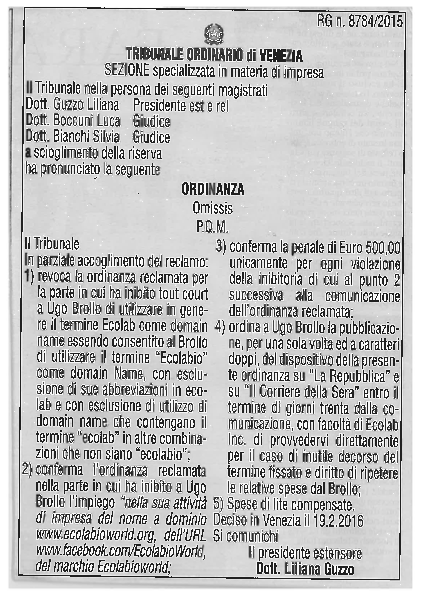THE SUPREME COURT RULES ON MANDATE CONTRACTS GOVERNING THE CLIENT-ATTORNEY RELATIONSHIP
18/01/2017
A corporation that has been removed from the companies register cannot appeal to the Supreme Court in that such company must be considered as no longer existing and, therefore, bereft of procedural legitimacy and interest in the appeal and without power to confer a special power of attorney for the judgment before the Supreme Court.
With judgment no. 6780 of 2016, the Italian Supreme Court declared that the petition filed by a company that had been removed from the companies register was inadmissible. According to the Court, a power of attorney must be conferred by a company that is not “legally extinct and without legitimacy to commence proceedings in application of art. 2495 of the Civil Code”.
The above mentioned judgments follows the Court’s ruling n. 15295 of 2014, in which the Court stated the following principle: the party that has joined proceedings via its attorney and has been affected by the events regulated by art. 299 of the Code of Civil Procedure (i.e. death or loss of procedural capacity), and that moreover has not declared or notified any of the aforesaid events pursuant to art. 300 of the Code of Civil Procedure, nevertheless continues to be represented by the same attorney (in Italian, this is known as the “principio di ultrattività del mandato”, which may loosely be translated as “principle of survival of the attorney’s mandate”). The legal position is stabilized also for the subsequent suspension and appeal stages, unless: in the course of the appeal, (i) the heirs of the defunct party join the proceedings; (ii) if the party was legally incapacitated, its legal representative joins the proceedings; (iii) the party’s attorney gives notice of the events pursuant to art. 300 of the Code of Civil Procedure.
The direction taken in 2014 is not undermined by the 2016 judgment, in so far as the latter is concerned with pointing out a different principle, that is that the attorney’s mandate cannot survive when an appeal is lodged before the Supreme Court.
In order to correctly petition the Court, the attorney requires a special power of attorney for appearing in judgment before the Court, as required by Art. 365 of the Code of Civil Procedure. Such power of attorney, however, cannot be conferred by the legal representative of an extinct company, because he or she has lost all powers of representation in consequence of the extinction of the corporate entity.

